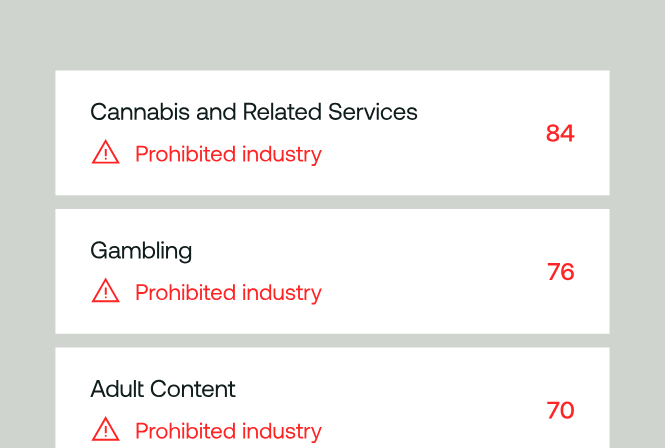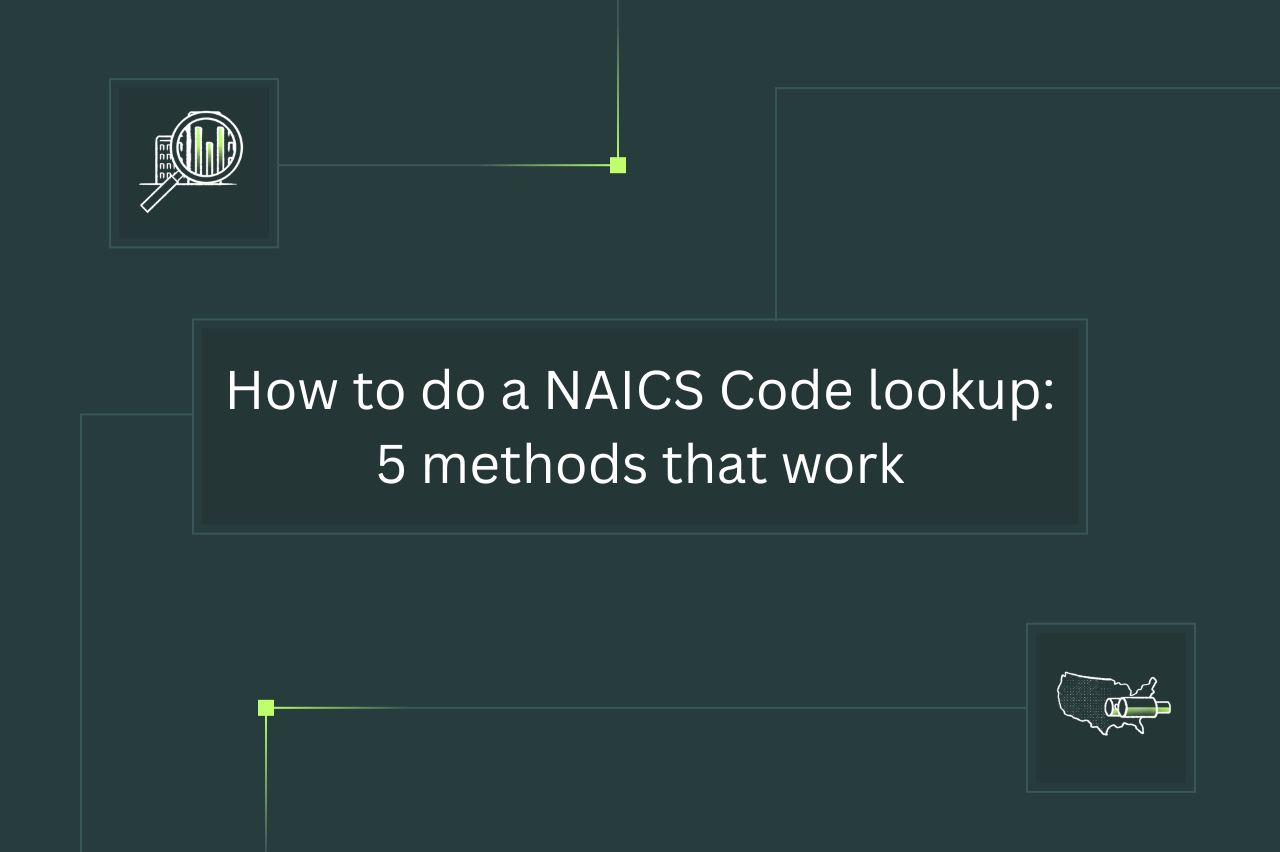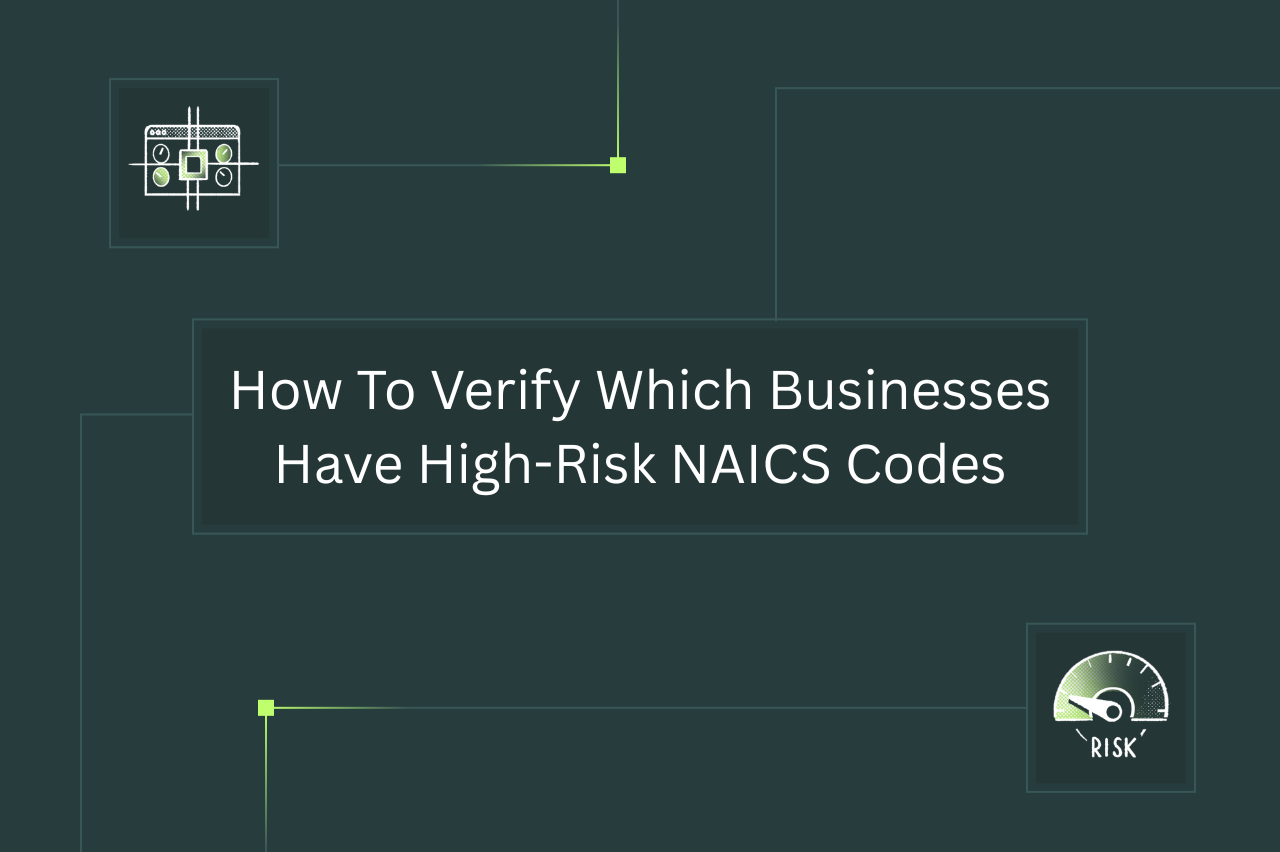In brief:
- Organizations will determine prohibited businesses based on whether products or services are illegal or potentially illegal, pose a reputational risk, or add operational costs associated with having to comply with additional regulatory requirements.
- Commonly-prohibited types of businesses include counterfeit, pirated, or stolen products; illegal drugs; firearms, explosives, and other hazardous materials; casinos and gambling; and adult content and products.
- Organizations can build prohibited businesses lists by checking national sanctions lists; investigating industries and associated regulations/restrictions; looking into the identity and activity details of businesses themselves; and clearly defining their core values.
By nature, B2B relationships come with a myriad of challenges when it comes to business verification. A key part of an organization initiating and maintaining B2B relationships is assessing the risks of associating with other (types of) businesses.
Some businesses and industries, based on (the nature of) their activities or where in the world they’re located, are outright against the law to deal with. Others, while not inherently illegal, may be incompatible with an organization’s reputation or branding. Or they may be too heavily-regulated to make the costs of associating with them justifiable.
Thus, organizations need to know which businesses they’re forbidden by law to associate with. They also need to carefully consider the pros and cons of dealing with businesses in certain industries due to other potential risks. These could include increased operating costs to meet regulations, or a loss of reputation due to associating with an industry that runs counter to an organization’s image.
This article explains what a prohibited business is, including why other organizations may not want (or be allowed) to form relationships with it. The article also gives examples of types of businesses that organizations commonly consider prohibited. Finally, it discusses how organizations can screen for prohibited businesses.
- What are prohibited businesses?
- Reasons for prohibiting business with a company
- Common types of prohibited businesses
- How to check and screen for prohibited businesses
Let’s first talk about what prohibited businesses are and why organizations use prohibited business lists.
Organizations can prohibit businesses (or industries) for a variety of different reasons. For example, some businesses may only prohibit businesses that are outright illegal, such as illegal drugs and illegal firearms. Other businesses could prohibit businesses that don’t align with their ethics, such as those that don’t meet certain environmental or sustainability standards.
Why do organizations use prohibited business lists?
An organization may use a prohibited business list to keep track of types of companies it will not do business with out of legal or risk considerations. It may also use such a list to proclaim that its clients and partners are not allowed to use its services to deal with the types of companies listed.
Note that not every organization will have the same list of prohibited businesses. One reason for this is laws differ between countries and territories. Another is that particular organizations may consider certain types of businesses and industries more or less risky. This could depend on factors like the organization’s reputation and values; the amount of additional regulations and restrictions on an industry; which demographics an organization is trying to reach; and so on.
What might cause an organization to put a business or industry on a prohibited list? Some general reasons a business or industry might land on a prohibited list include the following:
It’s inherently involved with illegal products, services, or activities
Many companies don’t want to be held legally liable for associating with a business that, by nature, is involved in criminal activity. These enterprises tend to have high operational risks, due in part—obviously—to their illegality. An organization is also at a high risk of taking a big reputational hit if it is caught dealing with these types of businesses.
It’s heavily-regulated, leading to increased operational costs
Some businesses and industries are not necessarily illegal (at least in certain jurisdictions), but still operate under heavy restrictions and regulations. An organization may prohibit dealing with them anyway because it doesn’t want to bear the extra compliance costs of being involved with those sorts of businesses. Such costs may include hiring expert employees and purchasing specialized systems to track, apply, and monitor changes to relevant rules.
Lack of regulation makes it too risky
On the other hand, there are certain types of businesses where regulations are light, inconsistently enforced, or both. While they aren’t inherently illegal, they are prone to being abused for unethical or unlawful activities. Examples include industries where the values of products are prone to wild fluctuations. Others include certain services in industries such as finance, law, medicine, or commerce where criminals can easily take advantage of people’s naivety, greed, and/or desperation to commit fraud.
It poses reputational risk or clashes with the organization’s brand
An organization might also choose to prohibit a business (or type of business) based on value judgments. For instance, there are certain industries or types of businesses that are considered culturally taboo, or are restricted to certain demographics (either by social custom or by actual legal regulations). Other times, an organization may consider its own core principles to be at odds with what a business or industry does.
Many organizations don't want to risk creating contradictory and/or unpopular public personas. This may alienate more customers than an organization would potentially gain by expanding its partnership network. So the organization avoids dealing with businesses and industries that are socially frowned upon, or are engaged in activities that run directly counter to its stated mission.
Next, we’ll take a look at what specific businesses might fit these profiles.
Given the above criteria, what are some types of businesses that are typically prohibited? Here are some examples, along with how often most other legitimate organizations will avoid dealing with them.
1. Counterfeit, Pirated, or Stolen Goods & Services
Always
These businesses make subpar-quality imitations or unauthorized copies of brand-name products or digital media. Then they try to sell these off as if they were genuine articles. This is a violation of intellectual property laws, so these businesses get blacklisted.
2. Illegal Drugs
Always
Some drugs are highly addictive and/or have dangerous psychoactive effects, so they are illegal. However, these properties also make manufacturing and trafficking in these drugs very lucrative for criminals. Legally-operating businesses will steer clear of these enterprises.
3. Medical and Healthcare Services
Sometimes
Illegal drugs aren’t the only ones that are controlled though. The medical industry as a whole is heavily regulated, as is dealing in medical products and services. While there isn’t a lot of negative stigma—or reputational risk—associated with selling medical products or services, there is a lot of red-tape.
To meet regulatory requirements associated with the medical industry, companies will likely need to expand operations and increase expenses. And for this reason, many companies choose to prohibit the sale of medical products and services entirely.
4. Firearms, Explosives, and Hazardous Materials
Typically
Most types of weapons, from hunting knives and bows to firearms and explosives, have their sale and ownership regulated in some way. Many organizations will avoid having to deal with these regulations by refusing to work with businesses that make or sell weapons (or at least certain kinds of them).
Other organizations will prohibit these types of businesses entirely because of the risks weapons present, both to other people as well as their owners. Still others will avoid associating with weapons dealers out of ethics concerns regarding violence. Others still may choose to prohibit dealing in weapons because of potential reputational damage based on the association.
5. Alcohol, Tobacco, and Cannabis
Sometimes
Alcohol and tobacco are controlled substances, as is cannabis in some jurisdictions. So there are several extra regulatory requirements related to selling them, possessing them, or even advertising about them.
Many organizations don’t want to deal with these extra rules and their nuances across jurisdictions (especially with cannabis), so they will prohibit these types of businesses altogether. Others will prohibit dealing with these industries because they consider the products immoral, or not suited to their image and/or target consumer demographics.
6. Casinos & Gambling
Typically
There are plenty of businesses that offer games of chance and skill to earn money or other prizes. But these games can be addicting, or lead to large amounts of money changing hands in a short amount of time. Thus, they tend to be heavily regulated in places where they aren’t outright illegal.
Even in situations where gambling is permitted, many organizations will avoid associating themselves with gambling-related businesses. They may not want the reputational risk of being tied to an industry that’s often publicly connected to addiction, financial loss, and sometimes even criminal activity; or they may simply feel that navigating the added regulations are not worth entering that market.
7. Adult Content & Products
Typically
Some businesses deal in products and services related to relationships and sexuality. These businesses typically have regulations on them that restrict them from catering to customers under a certain age. And some are outright illegal in certain places.
Therefore, many companies will avoid dealing with them out of regulatory—and sometimes moral or branding—concerns, even if some aren’t necessarily unlawful.
8. Virtual Currencies & Digital Assets
Sometimes
There’s still a significant lack of public understanding as to what virtual currencies—including cryptocurrencies like Bitcoin—are and how they work. Even national governments are finding it difficult to classify and regulate these new types of assets.
Their properties, including their highly-speculative pricing, have led to them being frequently abused to pull scams, money laundering, or other “get rich quick” schemes.
As a result, some countries have outlawed virtual currencies entirely. And even in nations where they are allowed, many organizations will still prohibit businesses that deal in them. Until more comprehensive regulations on them are enacted, virtual currencies may carry too high a risk of—and/or too much synonymy with—crime for organizations to want to get involved with them.
9. Businesses in Sanctioned Countries
Always
There are times when businesses aren’t prohibited based on the nature of what they do. Instead, they are simply located in prohibited countries to do business with. Such countries are usually sanctioned based on broader socio-political issues such as poor treatment of citizens, political corruption, military aggression, rampant crime, or sponsorship of terrorism.
Not every country will have the same list of countries it prohibits doing business with, as international relations can vary between countries. Also, socio-political situations in countries can change over time, so sanctions may be lifted if things improve.
For most companies, a prohibited business list starts with illegal (or potentially illegal) products and services. For these, organizations can check sanctions lists applicable to their country. For the U.S., that generally means conducting an OFAC check. These catalog individuals, groups (including businesses), and countries U.S. companies are prohibited from trading or doing business with.
Beyond that, there are certain types of businesses that may not be inherently illegal, but are heavily regulated or have a high risk of involving unlawful activities. So it’s up to your organization to do its due diligence using a Customer Identification Program (CIP) in researching business sectors, including what regulatory restrictions apply to them (or don’t) and how prevalent crime is in them.
Depending on your organization’s risk appetite, there are certain industries or types of businesses you may decide to completely avoid interacting with to mitigate unnecessary operational risks or compliance costs.
Your organization also needs to consider its core values, branding, value proposition, and customer base. Associating with new types of businesses may bring in new customers for an organization, but it can also alienate existing customers if it results in an unpopular or contradictory public persona.
Weigh the potential reputational costs against the potential business opportunities of getting involved with certain industries. Depending on where the balance falls, your organization may decide that partnering with certain types of businesses isn’t worth it and just deem them prohibited.
Using only a website URL, Middesk can identify a business’s industry (NAICS and SIC codes), flag whether they’re in a high-risk industry, and surface web presence information including social profiles.
Schedule a demo today to find out what Middesk can offer in terms of business verification and B2B relationship risk management.









